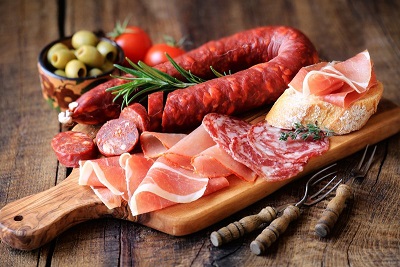
info.afrindex.com
China-Africa Trade Information Service

info.afrindex.com
China-Africa Trade Information Service

Image from ecr.co.za
About 90% of Kenya's meat production is in the hands of self-sufficient farmers and pastoralists. Today, the number of beef and dairy cattle is about 15 million, and large-scale livestock keepers are raising animals for commercial and livelihood purposes. The distribution of beef cattle is affected by the rainfall pattern. Most animals are kept in ranch in Rift Valley Province, especially in Nakuru, Trans Nzoia and Kajiado.
Over the years the total value of meat and meat products produced indicated an upward trend with the value of products from cattle and calves increasing from KShs 8,886.4 million in 1999 to KShs 11,476.1 million in 2003. The value of chicken and eggs also increased from KShs1,431.4 million in 1999 to KShs 1.624.5 million in 2003.
Kenya currently produces meat and meat products both for export and local consumption. The country exports both live animals and processed meat in the form of tinned meat and preparations, bacon etc mostly to East Africa and Middle East regions. Kenya has been exporting more of pork products than beef, mutton and goat meat combined in the last few years. Farmers Choice (FC), the leading processor and distributor of pork products in Kenya, exports about 1,500 tons per year (20% of its total production).Kenya’s total exports declined in 1985 as a result of the closure of the Kenya Meat Commission, who at the time was the leading exporter of canned meat.
Kenya is an ideal investment location for the meat industry as supported by various investor
friendly factors that include:-
Availability of beef cattle:- Kenya being an agricultural country has an estimated cattle population of 13 million heads out of which 9.7 million are beef, hence the country’s sustained availability of beef cattle.
Political stability:- Since independence, Kenya has maintained remarkable stability despite changes in its political system and crises in neighboring countries.
Access to the preferential market:- Exports from Kenya enjoy preferential access to world markets under a number of special access and duty reduction programmes. These include: East African Community, Common Market for Eastern & Southern Africa (COMESA), European Union-African-Caribbean-Pacific (EU-ACP) Cotonou Agreement, Generalised System of Preferences (GSP) and African Growth and Opportunity Act (AGOA).
Guarantees to Investors:- Kenya provides guarantees to local and foreign investors including against repatriation of capital and profits and guarantee against expropriation. Kenya is a member of the World Bank-affiliated Multilateral Investment Guarantee Agency (MIGA), which issues guarantees against noncommercial risks to enterprises. Kenya is also a member of the African Trade Insurance Agency (ATI), a multilateral export credit and political risk agency for COMESA member states as well as the International Council for Settlement of Investment Disputes (ICSID).
Labour availability:- Kenya has abundant and relatively well-educated population; therefore skilled and unskilled labour is readily available at reasonable rates.
Investor friendly arrangements:- The Kenya government guarantees investor friendly arrangements such as the Export Processing Zones (EPZ) program which offers attractive incentives to export-oriented investors and EPZ Authority to provide one-stop-shop service for facilitation and aftercare
Meat Production in Kenya – Investment Opportunities in the Meat Industry
Processing units:- Beef processing units to be put up in major livestock production regions such as the Rift Valley region.
Game meat:- Game meat is a new area, which has a very wide investment scope in Kenya. Areas like ostrich farming and crocodile farming have already proved to be profitable ventures.
Poultry processing:- At present commercial poultry processing is almost under a monopoly. There is scope to set up a second large-scale production and processing facility in order to supply chicken at affordable prices to the Kenyan consumers.
Artificial Insemination (AI):- Artificial Insemination Services: Artificial Insemination plays an important role in development of the livestock and dairy sub-sector. Since the Government is in the process of privatising these services, this offers an important opportunity for investment by the private sector.
Dipping Services:- Dipping services are important to tick-borne diseases, which can hinder the development of high quality beef and dairy products. In the past the Government has been providing the services, which are now being privatised. This area offers an important opportunity for private investment.
Animal feeds:- The cattle population in the country is estimated to be over 13 million heads requiring a substantial amount of animal feeds. The latter is fairly expensive at present and some of poor quality as there is inadequate an uneven distribution of mineral supplementation.